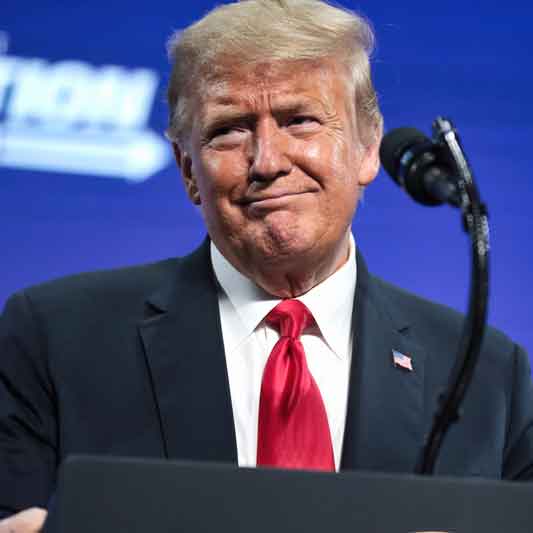In an unexpected diplomatic move, Colombian President Gustavo Petro announced on Monday, April 21, 2025, that the Trump administration had revoked his U.S. travel visa. This decision prevents him from attending key international meetings in Washington, D.C., and has heightened tensions between the two countries.
During a televised cabinet meeting at Casa de Nariño—the presidential palace in Bogotá—Petro stated: “I can’t go anymore because I think they took away my visa.” He explained his absence from the spring meetings organized by the International Monetary Fund and the World Bank in Washington.
The announcement was made casually amidst discussions focused on other issues. The offhand remark during a live Cabinet meeting, convened to address a yellow fever outbreak, surprised his ministers and attracted significant international attention.
Petro, Colombia’s first leftist president, went beyond merely announcing the visa issue. “I didn’t need a visa, but oh well. I’ve seen Donald Duck several times, so I’m going to see other things,” he added, referring to President Trump by the nickname “Donald Duck” in what appeared to be a critical comment.
The U.S. State Department has neither confirmed nor denied Petro’s assertion. According to multiple media reports, officials refused to comment on the situation, citing the confidentiality of visa records.
However, U.S. diplomatic sources in Bogotá and Washington deny that Gustavo Petro’s visa has been revoked, as reported by El Espectador. They note that such actions are typically accompanied by official notifications, which have not been issued.
The Colombian president’s statement emerges amid rising tensions between the U.S. and Colombia, a relationship that deteriorated swiftly after Trump’s return to the White House in January 2025. The two nations, traditionally close partners in anti-narcotics efforts, have increasingly clashed over immigration and trade policies.
The most significant recent conflict started in January when Petro initially refused to accept deportation flights from the U.S. military. The standoff almost led to a full-scale trade war between the nations.
In response to Colombia’s refusal, Trump threatened to impose a 25 percent “emergency” tariff on Colombian imports, which would increase to a 50 percent tariff the following week if Petro’s government continued to refuse the deportation flights.
The threat extended beyond tariffs. Trump announced he would impose a “travel ban and immediate visa revocations” and “visa sanctions” on government officials and their family members and supporters, and enhance border inspections of all Colombian nationals and cargo.
Secretary of State Marco Rubio supported the administration’s hardline approach, stating that the United States was no longer willing to be misled or exploited by foreign governments. He emphasized that it is not just a request but a fundamental responsibility for each nation to promptly and earnestly take back their citizens living illegally in the U.S., calling it an issue of fairness and national security.
Under mounting U.S. pressure, Petro eventually relented. On a Sunday night in January, Colombian Foreign Minister Luis Gilberto Murillo announced that the standoff with the United States had been resolved and confirmed that Colombia would resume accepting its deported citizens, ensuring they would be treated with dignity and recognized as individuals entitled to their rights.
Following the agreement, U.S. Homeland Security Secretary Kristi Noem traveled to Colombia in late March to meet with her counterpart, Foreign Minister Laura Sarabia. The two officials had what Noem described as a “candid” conversation and subsequently announced a data-sharing agreement to help U.S. authorities identify illegal immigrants.
Despite these diplomatic efforts, relations remain strained. If Petro’s claim about his visa proves true, he would become only the second Colombian president in history to have his U.S. visa revoked. The first was Ernesto Samper, who lost his visa in 1996 after allegations emerged that money from drug traffickers—specifically the then-powerful Cali Cartel—had financed his presidential campaign.
The visa controversy highlights broader issues in the bilateral relationship. Relations with the United States have been strained by disagreements over drug policy and a dramatic rise in coca cultivation. With an estimated 1,710,000 acres of illicit crops, Colombia risks losing its certification status with the U.S. Such a decision could severely impact security cooperation and trade terms.
The economic implications are significant. According to economic analysts, Colombia relies on access to the U.S. market for about a third of its exports, or about 4% of its GDP. Any deterioration in trade relations could have profound consequences for Colombia’s economy.
In the short term, Colombia’s finance minister, Germán Avila—who is already in Washington, D.C. this week—will assume responsibilities that would typically require the president’s attendance. Meanwhile, Foreign Minister Laura Sarabia is preparing to travel to New York, where she will address the United Nations Security Council, enabling Colombia to continue its diplomatic efforts despite the president’s apparent visa issues.
This episode represents the latest chapter in the evolving relationship between the United States and Colombia under the Trump administration. It has adopted significantly more aggressive positions on immigration and regional diplomacy than its predecessors.

